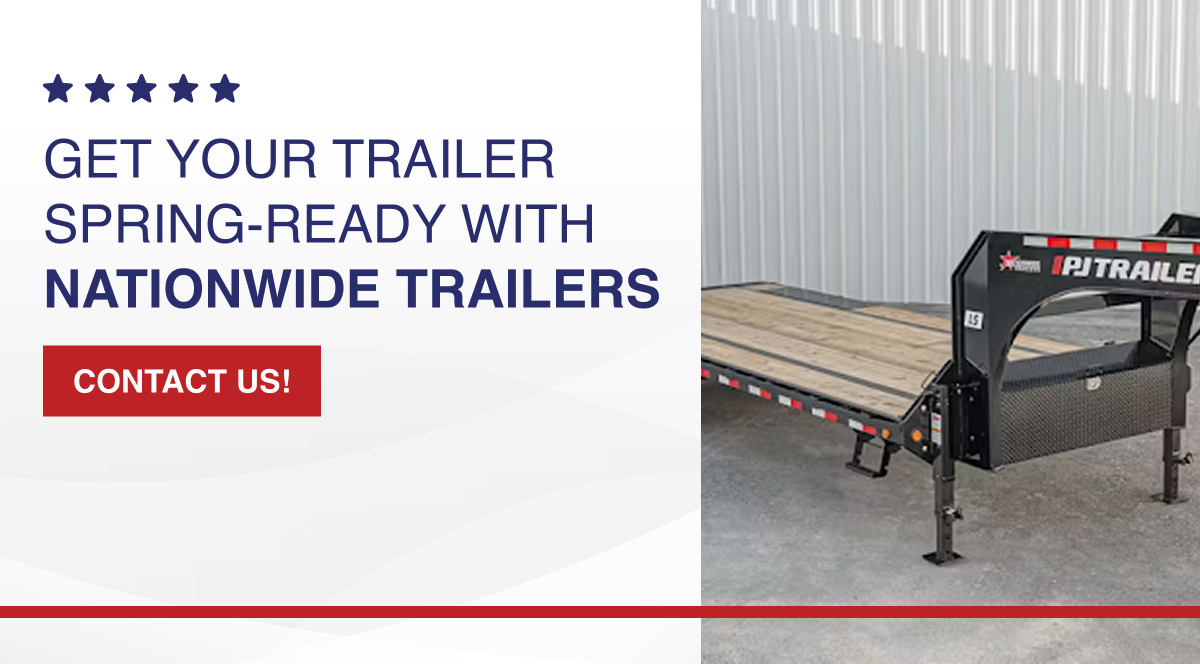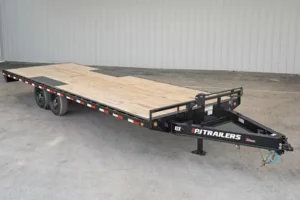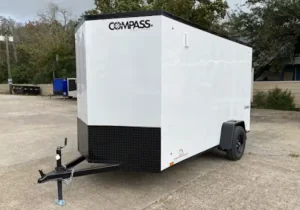
Winter is over, and as the snow melts away, it’s time to prepare your trailer for the busy spring season ahead. Regular spring trailer maintenance is essential for keeping your trailer in top condition, whether you’re hauling materials, towing equipment, or simply heading out for a road trip. Preventative care ensures trailer longevity, keeps you safe on the road, and saves costs by avoiding expensive repairs down the line.
At Nationwide Trailers, we’re here to make trailer maintenance easier than ever—because your trailer deserves the best care. To help you get started, we’ve compiled this step-by-step guide to essential spring tune-up tips.
Inspecting Tires
Your tires are one of the most critical components of trailer safety. After months of cold weather, they likely need closer inspection to ensure they’re road-ready. Here’s what to focus on:
1. Check Tire Pressure
Low tire pressure is a common issue after winter storage. Underinflated tires can reduce fuel efficiency, wear out faster, and even lead to blowouts while driving. Use a reliable tire pressure gauge to check the pressure against the manufacturer’s recommended levels, typically found in your trailer’s manual.
Pro Tip: Always check tire pressure when the tires are cold for the most accurate reading.
2. Examine Tread Depth
Worn tires can have a significant impact on your trailer’s grip and stability. Insert a penny into the tread grooves; if you can see all of Lincoln’s head, it’s time to replace the tires. Alternatively, some tires come with built-in tread wear indicators for added convenience.
3. Look for Signs of Wear or Damage
Inspect the sidewalls for cracks, bulges, or uneven wear patterns, which could indicate alignment issues or hidden damage. Don’t forget to check your spare tire—because nothing’s worse than discovering a flat spare when you need it most.
Checking Brakes
Safe braking is non-negotiable, especially for heavy trailers or fleets that travel long distances. Brake systems can wear down from months of icy roads, moisture exposure, or just sitting idle during the winter. Follow these steps to ensure your brakes are working optimally:
1. Inspect Brake Pads and Rotors
Remove the wheels to check the brake pads for excessive wear. If they’re too thin or uneven, replace them immediately. Also, examine the rotors for any noticeable grooves or warping, which could affect braking performance.
2. Assess Brake Lines
Look for cracks, leaks, or corrosion in the brake lines. Damaged lines can reduce braking power and even lead to failure in critical moments.
3. Test Brake Response
Once everything checks out visually, hitch up your trailer and take it for a short test drive. Pay close attention to how the brakes respond and listen for any unusual squeaks or grinding noises.
Need help? Nationwide Trailers offers professional brake inspections to keep you (and others) safe on the road.
Lubrication
Trailer components, especially those that move or bear weight, need regular lubrication to operate smoothly. Spring is the perfect time to apply grease and prevent rust build-up.
1. Grease Bearings
Wheel bearings endure a lot of pressure and wear over time. Apply high-quality grease to ensure they function smoothly and improve your trailer’s towing performance. Consider replacing bearings if you notice excessive wear or resistance during movement.
2. Lubricate Hinges and Latches
Hinges, latches, and other moving parts can become stiff, particularly after exposure to winter conditions. Apply a spray lubricant to these areas to prevent squeaking and ensure seamless operation.
3. Don’t Forget Suspension Components
Any springs, axles, or other suspension components should be greased to handle increased loads during the spring and summer months.
Lights and Electrical Systems
Your trailer’s lights do more than just light your path—they keep you visible to others and compliant with safety regulations. Inspecting electrical components is vital to avoid accidents and fines.
1. Test All Lights
Hook your trailer up to your vehicle and check whether the headlights, brake lights, turn signals, and side markers are functioning correctly. If any bulbs are out, replace them immediately with the correct type.
2. Examine Wiring
Inspect your trailer’s wiring for fraying, corrosion, or loose connections that can happen during winter storage. Use electrical tape or connectors to address minor issues, but for major concerns, consult a professional.
3. Verify Battery Health
If your trailer has a battery (e.g., for powering interior lighting or equipment), use a multimeter to check its charge. Recharge or replace the battery as necessary to ensure smooth operation all season long.
Give Your Trailer a Fresh Start Today
Spring trailer maintenance doesn’t just protect your investment—it keeps your operations efficient and your hauls stress-free. By taking these steps to check your tires, brakes, lubrication points, and electrical systems, you’re setting yourself up for a successful spring season.
Prepare your trailer for the season today! Call us to schedule your maintenance or visit your nearest Nationwide Trailers location.



